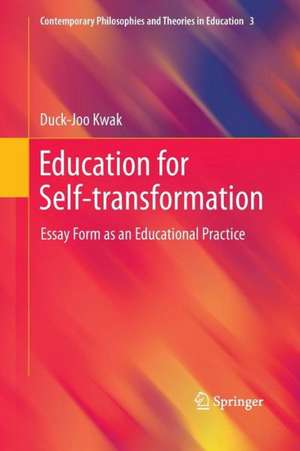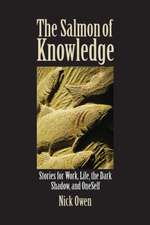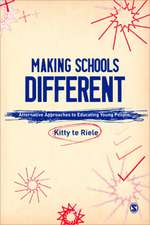Education for Self-transformation: Essay Form as an Educational Practice: Contemporary Philosophies and Theories in Education, cartea 3
Autor Duck-Joo Kwaken Limba Engleză Paperback – 29 noi 2013
Beginning by defining key terms such as ‘self-transformation’, Kwak sketches the contemporary debates between Jürgen Habermas and Charles Taylor on the status of religious language in the public domain, and its relationship to secular language. This allows her to contextualize her book’s central questions: how can philosophical practice reduce the experiential rift between knowledge and wisdom? How can the essay form be developed so that it facilitates, as praxis, pedagogical self-transformation? Kwak develops her answers by working through ideas of George Lukács and Stanley Cavell, of Hans Blumenberg and Søren Kierkegaard, whose work is much less familiar in this context than it deserves to be.
Kwak’s work provides templates for new forms of educational writing, new approaches to teaching educators, and new ways of writing methodology for educational researchers. Yet the importance of her ideas extends far beyond teaching academies to classroom teachers, curriculum developers – and to anyone engaged in the quest to lead a reflective life of one’s own.
| Toate formatele și edițiile | Preț | Express |
|---|---|---|
| Paperback (1) | 633.68 lei 43-57 zile | |
| SPRINGER NETHERLANDS – 29 noi 2013 | 633.68 lei 43-57 zile | |
| Hardback (1) | 639.90 lei 43-57 zile | |
| SPRINGER NETHERLANDS – 12 oct 2011 | 639.90 lei 43-57 zile |
Din seria Contemporary Philosophies and Theories in Education
- 24%
 Preț: 631.27 lei
Preț: 631.27 lei - 15%
 Preț: 638.11 lei
Preț: 638.11 lei -
 Preț: 385.25 lei
Preț: 385.25 lei -
 Preț: 481.05 lei
Preț: 481.05 lei - 15%
 Preț: 523.54 lei
Preț: 523.54 lei -
 Preț: 380.84 lei
Preț: 380.84 lei - 18%
 Preț: 880.25 lei
Preț: 880.25 lei - 15%
 Preț: 637.28 lei
Preț: 637.28 lei - 15%
 Preț: 640.55 lei
Preț: 640.55 lei - 15%
 Preț: 635.47 lei
Preț: 635.47 lei - 18%
 Preț: 721.63 lei
Preț: 721.63 lei - 18%
 Preț: 885.95 lei
Preț: 885.95 lei - 18%
 Preț: 775.30 lei
Preț: 775.30 lei - 15%
 Preț: 634.68 lei
Preț: 634.68 lei - 15%
 Preț: 635.96 lei
Preț: 635.96 lei - 18%
 Preț: 730.65 lei
Preț: 730.65 lei -
 Preț: 392.97 lei
Preț: 392.97 lei -
 Preț: 393.52 lei
Preț: 393.52 lei - 15%
 Preț: 645.28 lei
Preț: 645.28 lei
Preț: 633.68 lei
Preț vechi: 745.50 lei
-15% Nou
Puncte Express: 951
Preț estimativ în valută:
121.26€ • 126.92$ • 100.92£
121.26€ • 126.92$ • 100.92£
Carte tipărită la comandă
Livrare economică 31 martie-14 aprilie
Preluare comenzi: 021 569.72.76
Specificații
ISBN-13: 9789400737068
ISBN-10: 9400737068
Pagini: 160
Ilustrații: X, 150 p.
Dimensiuni: 155 x 235 x 8 mm
Greutate: 0.23 kg
Ediția:2012
Editura: SPRINGER NETHERLANDS
Colecția Springer
Seria Contemporary Philosophies and Theories in Education
Locul publicării:Dordrecht, Netherlands
ISBN-10: 9400737068
Pagini: 160
Ilustrații: X, 150 p.
Dimensiuni: 155 x 235 x 8 mm
Greutate: 0.23 kg
Ediția:2012
Editura: SPRINGER NETHERLANDS
Colecția Springer
Seria Contemporary Philosophies and Theories in Education
Locul publicării:Dordrecht, Netherlands
Public țintă
ResearchCuprins
Preface; Paul Standish.- 1. Introduction: Education as Self-transformation and the Essayist Form of Writing: Education for a Post-secular Age.- PART I - George Lukács: Practice of Philosophy for Existential Fulfillment.- 2. A Reflection on the Relation between Philosophy and Life; through Hans Blumenberg’s Work.- 3. A Response to Modernity Between Reason and Faith: Kierkegaard’s Ideas of Ethical Self and Subjectivity.- 4. Practicing Philosophy, the Practice of Education: Exploring the Essayist Form through Lukács’ Soul and Form.- PART II - Stanley Cavell: Practice of Education in the Essay-Form.- 5. Stanley Cavell’s Ordinary Language Philosophy as an Example of Practicing Philosophy in the Essay-form: In Search of a Humanistic Approach to Teacher Education.- 6. Philosophy as the Essayist Form of Writing: Cavell’s Concepts of Voice, Method, and Text.- 7. Cavell’s Essayist as the Political Self: Implication for Citizenship Education.- 8. Conclusion: The Essayist Form of Writing for a Tragic Form of Subjectivity.- Index.
Textul de pe ultima copertă
Exemplifying what it advocates, this book is an innovative attempt to retrieve the essay form from its degenerate condition in academic writing. Its purpose is to create pedagogical space in which the inner struggle of ‘lived experience’ can articulate itself in the first person. Working through essays, the modern, ‘post-secular’ self can guide, understand, and express its own transformation. This is not merely a book about writing methods: it has a sharp existential edge.
Beginning by defining key terms such as ‘self-transformation’, Kwak sketches the contemporary debates between Jürgen Habermas and Charles Taylor on the status of religious language in the public domain, and its relationship to secular language. This allows her to contextualize her book’s central questions: how can philosophical practice reduce the experiential rift between knowledge and wisdom? How can the essay form be developed so that it facilitates, as praxis, pedagogical self-transformation? Kwak develops her answers by working through ideas of George Lukács and Stanley Cavell, of Hans Blumenberg and Søren Kierkegaard, whose work is much less familiar in this context than it deserves to be.
Kwak’s work provides templates for new forms of educational writing, new approaches to teaching educators, and new ways of writing methodology for educational researchers. Yet the importance of her ideas extends far beyond teaching academies to classroom teachers, curriculum developers – and to anyone engaged in the quest to lead a reflective life of one’s own.
Beginning by defining key terms such as ‘self-transformation’, Kwak sketches the contemporary debates between Jürgen Habermas and Charles Taylor on the status of religious language in the public domain, and its relationship to secular language. This allows her to contextualize her book’s central questions: how can philosophical practice reduce the experiential rift between knowledge and wisdom? How can the essay form be developed so that it facilitates, as praxis, pedagogical self-transformation? Kwak develops her answers by working through ideas of George Lukács and Stanley Cavell, of Hans Blumenberg and Søren Kierkegaard, whose work is much less familiar in this context than it deserves to be.
Kwak’s work provides templates for new forms of educational writing, new approaches to teaching educators, and new ways of writing methodology for educational researchers. Yet the importance of her ideas extends far beyond teaching academies to classroom teachers, curriculum developers – and to anyone engaged in the quest to lead a reflective life of one’s own.
Caracteristici
Expounds a new modality of educational essay-writing and combines this with insightful recommendations for new pedagogical approaches to educator training Introduces to educational researchers examples of unexplored yet richly productive writing and thinking methodologies Synthesizes the ideas of key thinkers from different traditions in a way that will help secondary and university teachers responsible for curriculum development in the arts and humanities













